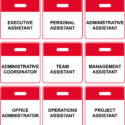
Lucia Landini explores ways of working with a micromanager
The relationship between an executive and an Assistant is based on trust and respect: the more the executive delegates, the more the Assistant can take responsibility, practice leadership, manage their time, undertake projects and grow in their role. However, the process of completing a project becomes slower and more complicated if the executive is a micromanager.
What is a Micromanager?
A micromanager gives excessive supervision to an employee and doesn’t delegate tasks. He or she is an executive who will frequently criticise an employee’s work, finding faults in anything, thus showing a lack of trust. A micromanager constantly asks for reports and updates and expects to be copied in every email. Work needs be modified continuously, and deadlines are not met. Eventually the micromanager’s team may lack motivation, confidence, become frustrated and resentful, and experience fatigue, stress and health problems from overwork.
Of course, we all expect things to be done ‘the right way’, which means ‘our way’ and we often make efforts to correct what is not executed as we expect. Yet this kind of management can make the Assistant feel less powerful or less entitled to act, and to experience low self-esteem.
An Example
Here is a simple example: your executive asks you to book a restaurant for a special meeting with a client; you give them the options of the restaurant suitable for the occasion, they choose the one they prefer and the menu; you proceed with the reservation, give credit card details, confirm the menu, go to the restaurant to check the location, send the relevant emails… and then they change their mind. They decide that the second restaurant option is better, and while you cancel and rebook again, your executive speaks to another colleague who convinces them to try a third restaurant.
If your executive changes their mind on a lot of activities that have already started, it means you do the work at least twice. It might take many hours of your working day redo the work, which means that the rest of the urgent stuff is still waiting on your desk.
Control Your Emotions
How can we survive and improve the way we work? The first step is to control your emotions. Do not explode in anger when you feel like your executive is interfering. Stay calm and don’t take it personally. Concentrate on your work, not on their job or their personality, which you can’t change and have no control over. Do not fight over everything: if you believe your method is better than your executive’s, ask for the freedom to try it, and explain that you’ll keep your executive in the loop.
Be Proactive
We need to ask for meetings to clarify the situation when we are calm, and we have our emotions under control. So be proactive, be the first to find out your executive’s expectations of your role. Then, agree on what you need to accomplish in detail, and by when. Create a document to track your progress and to share with your executive. Adapt your style to work better with your executive’s style and learn their preferred method of communication. Do your work on time and inform them if you encounter difficulties or if delays are expected. Take a moment to discuss the situation with your executive, explain your idea about handling it, and ask for feedback.
Finding a balance between your executive’s need for information and involvement, and your need for freedom to be productive is a lot of work. Initially, your attempts might fall on deaf ears. Sometimes you might be tempted to give up, but it is not worth the risk: since your executive needs to remain in control, they will ask, late at night, where are you on that project? And expect immediate detailed explanations.
Manage Your Health
Above all, be very mindful of your own health. If you feel the job is taking too much of your energy, you can’t manage all the requests, you have stopped sleeping at night, or if you feel like crying, please tell someone. It is not a failure or a sign of weakness, it is not giving up, it is giving value to you and your job.












